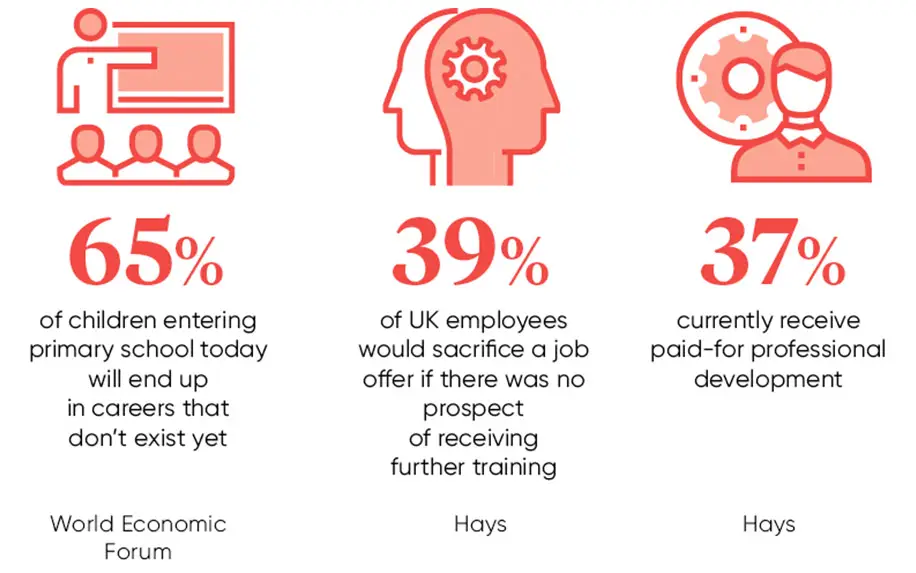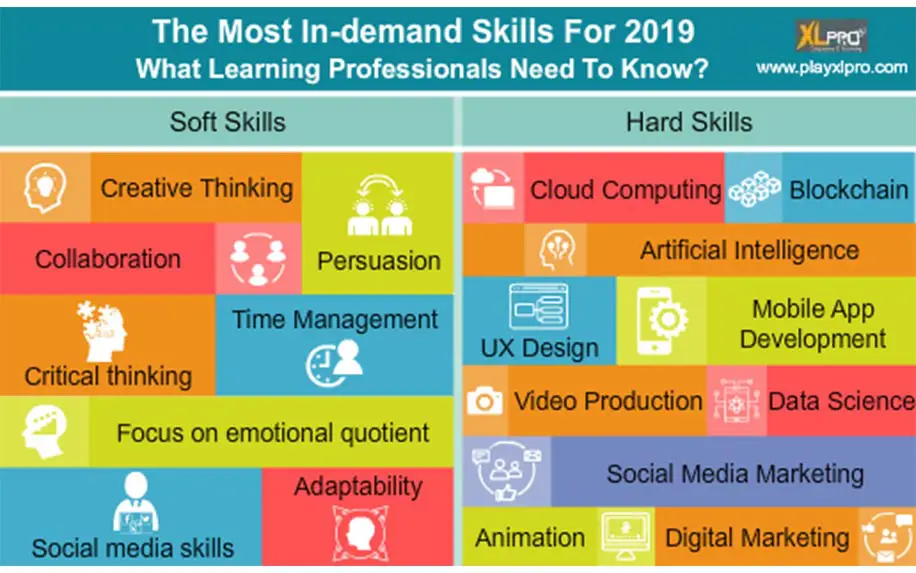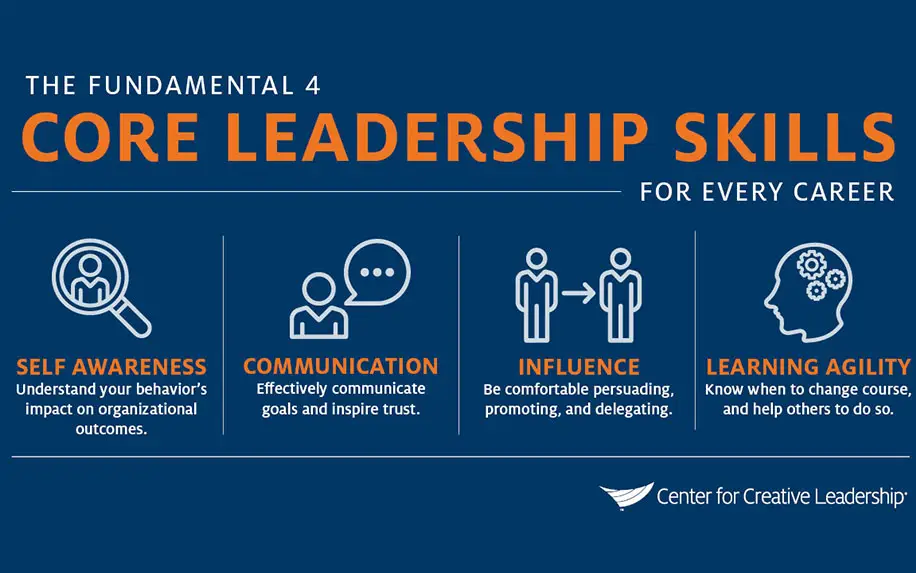These days, it’s crucial to constantly acquire new skills. Whether you’re an individual or a business, it’s possible to choose a training course which will help you achieve just about any goals.
In fact, an increasing number of people won’t even accept a job offer if there is no prospect of acquiring new skills through ongoing training. This is because they recognise the risks of letting their skills stagnate.

Some courses are focused on specific professional skills, while others are more geared towards helping you or your employees develop into more rounded people. In either case, choosing a course is all about deciding whether it’s worth the money and effort to complete.
The right training course for you is a training course that gives you an advantage This can occur in the workplace and in your life, in general. It could be quite overwhelming for you to find the right training course for you, but that’s where we come in.
In this article, we highlight the process of finding the right course for you. It is a crucial process to find the right course for you. You will likely be working on a training course for the next few months. You should know what the right training course for you is, so you don’t waste your time.

We will also answer the most common questions asked when it comes to finding the right training course for you.
We understand that this is a big step, because you’ll be starting from scratch. You may even get flashbacks of classrooms and assignments, but that’s not all there is to learning a new skill.
Before we get to that, let’s cover some basics.
Table of Contents
What is a Training Course?
A training course is a series of lessons and workshops in any aspect. The goal is to enhance your skills in a certain field as expediently as possible.
By finding the right training course for you, there is no disadvantage to working on your qualifications. A training course can be implemented in any field from leadership to aerodynamics.
You will find online or offline training courses. Indeed, these days it is possible to find training courses to suit the practical needs of just about any kind of learner.
A training course is a selection of classes that teach you skills and knowledge of a certain activity. However, before you start writing checks, there are a number of things you should consider.
These include the amount of time you can put into the training course, the field that you want to excel in, and your particular circumstances and learning style. Once you decide the right training course for you, you’ll be able to start your journey on becoming better at what you do.
What Course Should I Choose?
There are myriad training courses that you can choose from, which is a benefit on your end. The sky’s the limit and you won’t have to worry about finding a field of interest and not being able to find a training course for it.
One essential training course that most employees develop in is public speaking. Public speaking training courses are very common in every company. This is because it is a stepping stone to being a good leader.
But with so many options out there, how are you supposed to decide what to study?
One way to go about this is to start with your personal and professional goals. Sometimes, this might make it pretty easy to decide on a course, for instance, if you want to pick up a very specific skill, like Excel.
More often, your goal might be a little more nebulous. It might even be something to earn more money, or to cut costs for your business.
The Value of Broad Learning
If you chose a training course in psychology, information technology or even marketing, then you’re probably wondering if you made the right choice. It’s simple; you did make the right choice.
The trick is to see the transferable value in whatever course you take.
Project management training courses, for example, are one of the better training programs that you’ll find. If you are a leader of some sort on any task at work, project management will help you keep yourself up-to-date and organized throughout the entirety of the project.
This applies even if you don’t end up with project manager as your job title.
In this vein, you should start with your ultimate goal, and then break this down into some of the more specific skills and knowledge you will need to achieve this. Then, what you have to do is match this to the content of the courses you’re considering.
Once you decide on the right training course for you, you should think of the quality of a training course!
What Makes A Good Training Course? Quality vs. Quantity
A good training course is perceptibly different than the right training course for you. We mean a good training course when we compare its quality with other courses. You’ll find that a good training course is a well-rounded experience.
This leaves you fully informed and well-versed on the topic you’re interested in. According to Training Magazine, a good training course is classified as various techniques that implement the lessons to its audience.
If the training course offers you different methods or gives you the chance “to think outside the box,” then you’ll find yourself with a good training course. In other words, look out for chances to apply your new knowledge in a controlled environment.
Another way to know if you’re in a good training course is the person who is mentoring you.
Your mentor should be knowledgeable and enthusiastic to give the training course. Their enthusiasm will set a great example for the trainees and give them incentive to keep going with the course.
A good training course should also revolve around the way trainees are excited to continue with the training course. You should be excited to know more and be more participant. You’ll also find yourself very interested in the content and quality of the training course.
To summarise, a good training course is defined through the methods the lessons are explained, the person mentoring you and the amount of incentive or excitement you feel towards the right training course for you.
At the end of the training course, you might find yourself excelling at a certain skill. The training course, by then, will have achieved its quota of educating you.
Most Popular Professional Training Courses

Of course, another way to choose a course is to look at what other people are doing. The demand for training is a good indicator of the demand for skills.
Here are some of the most in demand professional skills today:
You’ll find that these training courses are the most common because they are both work-related training courses They also revolve around personal development. Along with personal development, marketing is a trending industry in the digital world we live in.
This is why most people try to enhance their online marketing skills. The following courses are the most common courses; any one of them could be the right training course for you.
Marketing

Marketing courses revolve around learning the ropes of digital marketing. You will be able to learn search engine optimization, marketing trends and how to handle social media accounts.
Another aspect of marketing training courses is how to deal with feedback from audiences.
You’ll also learn how to attract clients for your brand or company. Marketing training courses refer to digital modes of marketing and how to use them efficiently. You’ll be able to understand marketing development and what it is to be a digital marketer.
Leadership Training Courses

Leadership courses consist of the factors that make you a good leader and how you can achieve it. Human labour is the most essential asset in a company and good leaders are a big factor of that.
Most managers attempt to develop their skills as a leader, or employees try to take a more initiative role as a future leader.
In order to be a good leader, there are certain qualifications that need to be endowed onto them since they’ll lead by example. You can try to be a good leader by taking leadership training courses.
There are a lot of people out there who don’t realise that they need leadership training. We’ve all had a manager who mistakes interfering in our lives with leadership. Here are the qualities a good leader should have:

Of course, these are skills that just about anyone could benefit from. This speaks to an important point. That is, you don’t have to be in a managerial position to benefit from leadership skills.
Emotional Intelligence

Emotional intelligence training courses are important for both the workplace and for your personal life. You will be able to be in complete control of your emotions, whilst not allowing it to cloud your judgment.
Emotional intelligence courses will teach you how to rationalize and compartmentalize your emotions and thoughts. You will also be able to learn how to be in charge of your actions and think clearly.
This is very important because you’ll need to achieve these goals to develop professionally and personally.
More importantly, emotional intelligence helps you to be more perceptive of the needs and motivations of others. This is a vital skill in any area where you need to communicate with colleagues or clients.
Entrepreneurship

Entrepreneurship is an important aspect for business owners. So, if you’re a business owner then the right training course for you would be entrepreneurship.
Entrepreneurship training courses refer to teaching you how to start your own business from scratch.
However, entrepreneurship is not just for starting up companies, but also for expanding firms. Entrepreneurship training courses help you understand what it means to own your own business and how you can handle it.
You’ll also learn the drawbacks and benefits of being your own boss.
Examples and Metrics Demonstrating the Tangible Impacts of High-Quality Training
Here are some specific examples and metrics showcasing the benefits of high-quality training, highlighting its connection to promotions, salary gains, and certifications:
Promotions:
- Case Study: A large software company implemented a leadership development program for its middle managers. Within two years, 70% of program participants received promotions compared to 30% of those who did not participate.
- Metric: Track the promotion rate within 12 months of completing a specific training program compared to a control group who did not undergo the training.
Salary Gains:
- Study: A study by the U.S. Department of Education found that individuals with a professional certification earn an average of 6-13% more than those without one.
- Metric: Compare the average salary increases of program participants within the year following completion to the average salary increase of non-participants in the same role.
Certifications:
- Example: A healthcare provider offered a training program for nurses on a new medical technology. After completing the program and obtaining the relevant certification, 95% of participants received a pay raise or bonus.
- Metric: Track the percentage of program graduates who achieve relevant certifications and measure the average salary increase or bonus received compared to non-certified colleagues.
Additional Metrics:
- Increased employee engagement and satisfaction: Track employee surveys and performance reviews before and after training to measure improvements in morale, motivation, and productivity.
- Reduced turnover: Compare the turnover rate of employees who have undergone training to those who have not.
- Improved client satisfaction: Measure client satisfaction before and after employees complete training related to customer service or technical skills.
Tips for Effective Demonstration:
- Focus on specific programs and measurable outcomes: Instead of making general claims, link training initiatives to concrete results achieved by participants.
- Use credible sources and data: Back up your claims with statistics, research studies, and case studies from reputable organizations.
- Personalize the impact: Share success stories of individuals who benefited from the training, showcasing how it impacted their careers.
- Quantify the benefits: Whenever possible, put a monetary value on the impact of training, such as increased revenue or cost savings.
Incorporating Quotes for Enhanced Credibility
Adding quotes from learners and industry experts can significantly bolster the credibility and impact of your article on choosing a training course. Here are some ways to incorporate them:
Learner Quotes:
- Highlighting the value of specific criteria: Include quotes from individuals who benefited from training programs that met certain criteria, like practical skills focus or strong instructor expertise.
“The hands-on workshops in the digital marketing course were what really made a difference. I was able to immediately apply the skills I learned to my job and saw a tangible increase in website traffic.” – Sarah Thompson, Marketing Manager
- Demonstrating the impact on career outcomes: Feature quotes from learners who achieved promotions, salary increases, or certifications after completing high-quality training programs.
“Enrolling in the project management certification program was the best career decision I made. It equipped me with the knowledge and confidence to lead complex projects, and I was promoted to Senior Project Manager within a year.” – John Lee, Project Management Professional
Industry Expert Quotes:
- Providing insights on training best practices: Include quotes from trainers, career coaches, or HR professionals who emphasize the importance of specific criteria in effective training programs.
“The most impactful training programs go beyond theoretical knowledge and focus on developing practical skills and real-world application. Learners need to be able to take what they learn and immediately apply it to their work.” – Dr. Jane Miller, Training & Development Consultant
- Highlighting the correlation between training and business success: Feature quotes from CEOs, business leaders, or industry analysts who emphasize the ROI of investing in high-quality training for their employees.
“At our company, we view training as a strategic investment in our workforce. By providing top-notch programs that align with our business goals, we’ve seen significant improvements in employee performance, productivity, and ultimately, our bottom line.” – Mr. David Jones, CEO of Tech Solutions Inc.
Tips for Effective Quote Integration:
- Choose relevant quotes: Ensure the quotes directly address the criteria you’re discussing and provide valuable insights or perspectives.
- Provide context: Briefly introduce the quotee and their credentials to establish their expertise.
- Use visuals: Consider including images of the quotees alongside their quotes for added impact.
- Variety is key: Mix and match quotes from learners, experts, and business leaders to offer a well-rounded perspective.
FAQ: Choosing the Right Training Course
Q: What type of training course is right for me?
A: The best training course depends on your individual needs and goals. Consider your current skills, career aspirations, budget, and preferred learning style (online, in-person, self-paced). Research different types of courses (professional certifications, vocational programs, workshops) and choose one that aligns with your specific requirements.
Q: How much should I invest in training?
A: The cost of training varies widely depending on factors like the program’s duration, intensity, and provider. Consider the potential return on investment (ROI) when making your decision. A high-quality course that leads to increased earning potential or career advancement might be worth a higher investment.
Q: What are some red flags to watch out for when choosing a training course?
A: Be wary of programs that make unrealistic promises of guaranteed job placement or overnight career success. Research the provider’s reputation, qualifications of instructors, and course curriculum before enrolling. Look for accreditation or industry recognition as indicators of quality.
Q: How can I make sure I get the most out of my training?
A: Set clear learning goals, actively participate in the course, ask questions, and apply what you learn to your work or personal projects. Network with fellow learners and instructors, and seek mentorship opportunities to further your professional development.
Q: What are some additional resources for finding the right training course?
A: Utilize online platforms like Coursera, Udemy, and LinkedIn Learning to explore a variety of courses. Attend industry events, connect with professional organizations in your field, and leverage career counseling services for personalized guidance.
Conclusion: Invest in Your Future with the Right Training
Choosing the right training course can be a transformative experience, unlocking new skills, boosting your confidence, and propelling you towards your career goals. By carefully considering your needs, doing your research, and selecting a high-quality program, you can make a valuable investment in your future.
Remember, lifelong learning is key to success in today’s dynamic job market, so embrace the opportunity to continuously grow and evolve through targeted training.
How to Choose the Best Training Course for You
The right training course for you is the training program that fits your needs and revolves around the topic of your interest. A training course is a selection of classes that would teach you skills and knowledge of a certain activity.
Any information you retain from the training course will help you achieve more goals. This could be in the office or in your personal life.
A good training course is defined through the methods the lessons are explained, the person mentoring you and the amount of incentive or excitement you feel towards the right training course for you.
In terms of professional skills, sometimes the best option is to follow the crowd. The most common training courses include: marketing, leadership, emotional intelligence and entrepreneurship.


